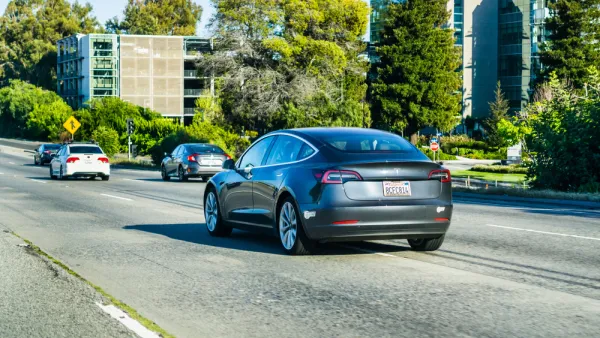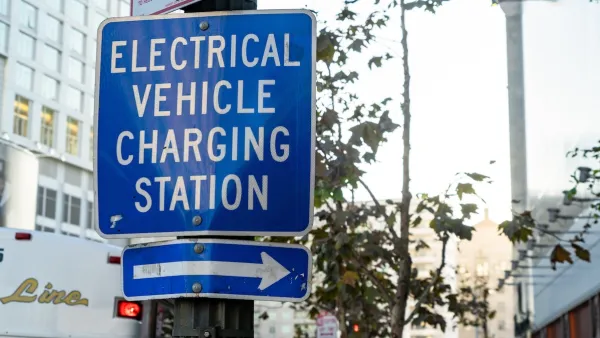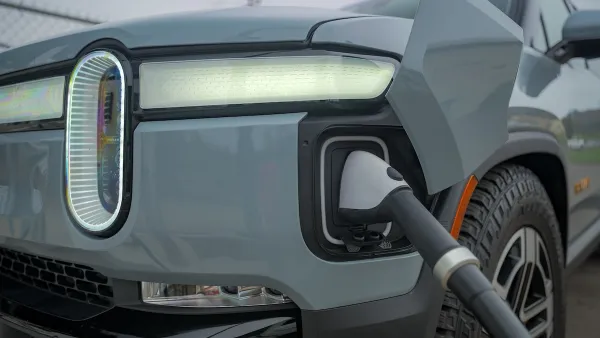The Treasury Department released long-awaited rules required by the historic Inflation Reduction Action on March 31 that will determine which electric vehicle models purchased after April 17 will qualify for a federal credit up to $7,500.

“The Biden administration released a long-awaited update to the rules governing which electric vehicles are eligible for a tax credit, and while we still don’t know which vehicles will meet the new standards, one thing is for sure: fewer EVs are going to qualify,” reported Andrew J. Hawkins, transportation editor at The Verge on March 31 in the source article.
The new rules, which were published by the Treasury Department on Friday, address outstanding issues related to the source of the critical minerals contained within an EV battery. Under the Inflation Reduction Act (IRA), only electric vehicles with battery materials sourced from the US and its approved trading partners will qualify for the $7,500 credit.
[Related: ‘Inflation Reduction Act’ a Mixed Bag for Climate Action, Planning Innovation, August 1, 2022]
The notice by the Internal Revenue Service (IRS), the largest of Treasury's bureaus, states that the “critical mineral and battery component requirements will apply to vehicles placed in service on or after April 18, 2023, the day after the Notice of Proposed Rulemaking is issued in the Federal Register.”
Until then, prospective EV owners can see the tax incentives via fueleconomy.gov (U.S. Department of Energy's Office of Energy Efficiency and Renewable Energy) for the 37 makes and models of all-electric and plug-in hybrid vehicles from 13 manufacturers that are currently eligible:
- New Plug-in and Fuel Cell Electric Vehicles Purchased in or after 2023
- Pre-Owned Plug-in and Fuel Cell Electric Vehicles Purchased in or after 2023
- New Plug-in and Fuel Cell Electric Vehicles Purchased Before 2023
“The roughly two-week delay will give auto manufacturers time to figure out if their electric vehicles qualify under the new guidance, enabling them to certify sourcing and price information so consumers know which models can get the government-provided discount,” reported Laura Weiss for Roll Call on March 31.
John Bozzella of the Alliance for Automotive Innovation, a major trade group for automakers, said in a blog post that he expected few models of electric vehicles currently on the market will be eligible for the full $7,500 credit in mid-April. But he said Treasury has "done as well as it could to produce rules that meet the statute and reflect the current market," given what was written into the climate law.
Narrowing criteria
“The rule that EVs must be manufactured in North America went into effect at the beginning of the year, eliminating upward of 70 percent of EVs on the market from eligibility, according to the Alliance,” added Hawkins of The Verge.
In addition, a set of income requirements and price caps went into effect that month: sedans that start under $55,000 and SUVs and trucks that start under $80,000 qualify for the credit.
According to Fueleconomy.gov, the maximum adjusted gross income for a buyer to qualify for the IRA tax credit can not exceed:
- $300,000 for married couples filing jointly
- $225,000 for heads of households
- $150,000 for all other filers
Made in America requirement extends to batteries
“The IRA requires EV batteries to have at least 40 percent of materials sourced from North America or a US trading partner by 2024 in order to be eligible for a $7,500 tax break,” added Hawkins.
By 2029, battery components would have to be 100 percent made in North America.
The requirement comes from Sen. Joe Manchin (D-W.V.), the co-sponsor of the Inflation Reduction Act, which was a much scaled-down version of the Biden Administration's ill-fated Build Back Better proposal.
“Manchin has pressed Treasury to get the sourcing requirements in place faster and adhere to a strict reading of the rules as he weighs whether to run for reelection next year in what Inside Elections with Nathan L. Gonzales rates a battleground race,” added Weiss of Roll Call.
He once again slammed Treasury's handling of the electric vehicle credits on Friday morning, saying in a statement that the new guidance completely ignores the intent of the August law to bring manufacturing jobs to the U.S. and ensure reliable, secure supply chains.
“Under the current supply chain, the vast majority of EVs have batteries, minerals, and components heavily sourced from other countries, China in particular,” noted Hawkins. “China alone accounts for some 70 percent of the global supply of battery cells.”
More on EV batteries in Planetizen: Electric Car Batteries Spark Weight Concerns, January 16, 2023 - NPR
FULL STORY: Fewer EVs will qualify for the federal $7,500 tax credit under updated rules

National Parks Layoffs Will Cause Communities to Lose Billions
Thousands of essential park workers were laid off this week, just before the busy spring break season.

Retro-silient?: America’s First “Eco-burb,” The Woodlands Turns 50
A master-planned community north of Houston offers lessons on green infrastructure and resilient design, but falls short of its founder’s lofty affordability and walkability goals.

Delivering for America Plan Will Downgrade Mail Service in at Least 49.5 Percent of Zip Codes
Republican and Democrat lawmakers criticize the plan for its disproportionate negative impact on rural communities.

Test News Post 1
This is a summary

Test News Headline 46
Test for the image on the front page.

Balancing Bombs and Butterflies: How the National Guard Protects a Rare Species
The National Guard at Fort Indiantown Gap uses GIS technology and land management strategies to balance military training with conservation efforts, ensuring the survival of the rare eastern regal fritillary butterfly.
Urban Design for Planners 1: Software Tools
This six-course series explores essential urban design concepts using open source software and equips planners with the tools they need to participate fully in the urban design process.
Planning for Universal Design
Learn the tools for implementing Universal Design in planning regulations.
EMC Planning Group, Inc.
Planetizen
Planetizen
Mpact (formerly Rail~Volution)
Great Falls Development Authority, Inc.
HUDs Office of Policy Development and Research
NYU Wagner Graduate School of Public Service





























